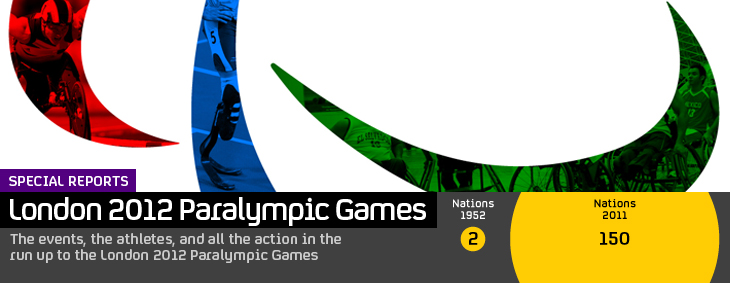Can the Paralympics inspire a generation?
London 2012 aims to inspire a generation but the mum of one 10-year-old wheelchair user tells Channel 4 News some sports clubs don’t want her son because of health and safety fears.
Alec Jenkins cannot decide whether he wants to be an Olympian or a Paralympian when he grows up. The 10-year-old from Reigate in Surrey has osteogenesis imperfecta, or brittle bone disease, and has suffered 32 fractures since he was born.
Alec is an “intermittent wheelchair user” which means he can be running around one day, but in a chair the next. As well as using his wheelchair when he has a broken bone, he also uses it as a safety precaution when he is well.
Like many young children Alec loves sport – in particular tennis – so Channel 4 News arranged to film him at Reigate Priory Lawn Tennis Club. It was the third tennis club we contacted, and the only one happy to get involved.
Alec’s mum Manda says Reigate Priory Lawn Tennis Club is the exception rather than the rule.
“The tennis clubs don’t want him. They haven’t got the facilities and aren’t disabled friendly. In some cases he can’t actually access the tennis courts in his wheelchair, they’ve got gravel pathways, and for him to propel himself over those is nigh-on impossible.”
The other problem Alec faces is equipment. His manual wheelchair is heavy and difficult to manoeuvre so Alec has to wear special splints to avoid breaking his wrists as he propels himself forward when he’s playing.
‘A great shame’
It is more than seven years since London won the bid to host the Paralympics, but according to one charity Alec’s story is not unusual.
Chief Executive of Whizz-Kidz Ruth Owen told Channel 4 News the charity “regularly” hears how difficult it is for disabled youngsters to get involved in sport.
“The facilities are often not accessible: they have steps, gravel paths, nothing’s flat and often there’s the attitude that some people don’t think disabled young people should be playing sport due to health and safety. I think that’s a great shame,” she said.
The Tennis Foundation has offered to help Alec Jenkins get involved in the sport. Disability Development Manager Dan Absolon told Channel 4 News moves are being made to ensure all people with disabilities can play.
“One of the best things about tennis is that it is such an adaptable sport and there are versions for everyone, whatever their ability,” he said.
“With the upcoming Paralympic Games, there is a focus on what a great sport wheelchair tennis is, but there are also specific versions of the game for people with hearing or visual impairments, for example.”
Meanwhile, a spokesperson for the Health and Safety Executive (HSE) told Channel 4 News: “The organisers of sporting events and would-be disabled competitors should discuss in advance how their needs can best be met.
“Anyone who believes they are being denied an opportunity under the pretence of health and safety should challenge that claim. As the world looks to London to set an example, it’s time to show a bit of ‘can do’ spirit not find excuses to hide behind.”
‘Boosting participation’
Following London’s successful 2012 bid for the games, the Department for Culture, Media and Sport produced a document vowing to “boost participation of disabled people in sport and physical activity”.
Currently 17.6 per cent of disabled people play sport at least once a week, up from 15.1 per cent in 2005/6 when the Olympic and Paralympic bid was won.
The British Paralympic Association hopes to improve on that with a plan that outlines goals for the next five years to highlight the power of sport to inspire change in people’s lives.
Manda says the Games are inspiring her son to take part in sport despite the setbacks.
“You get to the point where you want to give up but then he’ll come out with something like ‘one of his friends has just achieved something in this sport so why can’t he do it’ and it fires you up to keep going,” she said.
